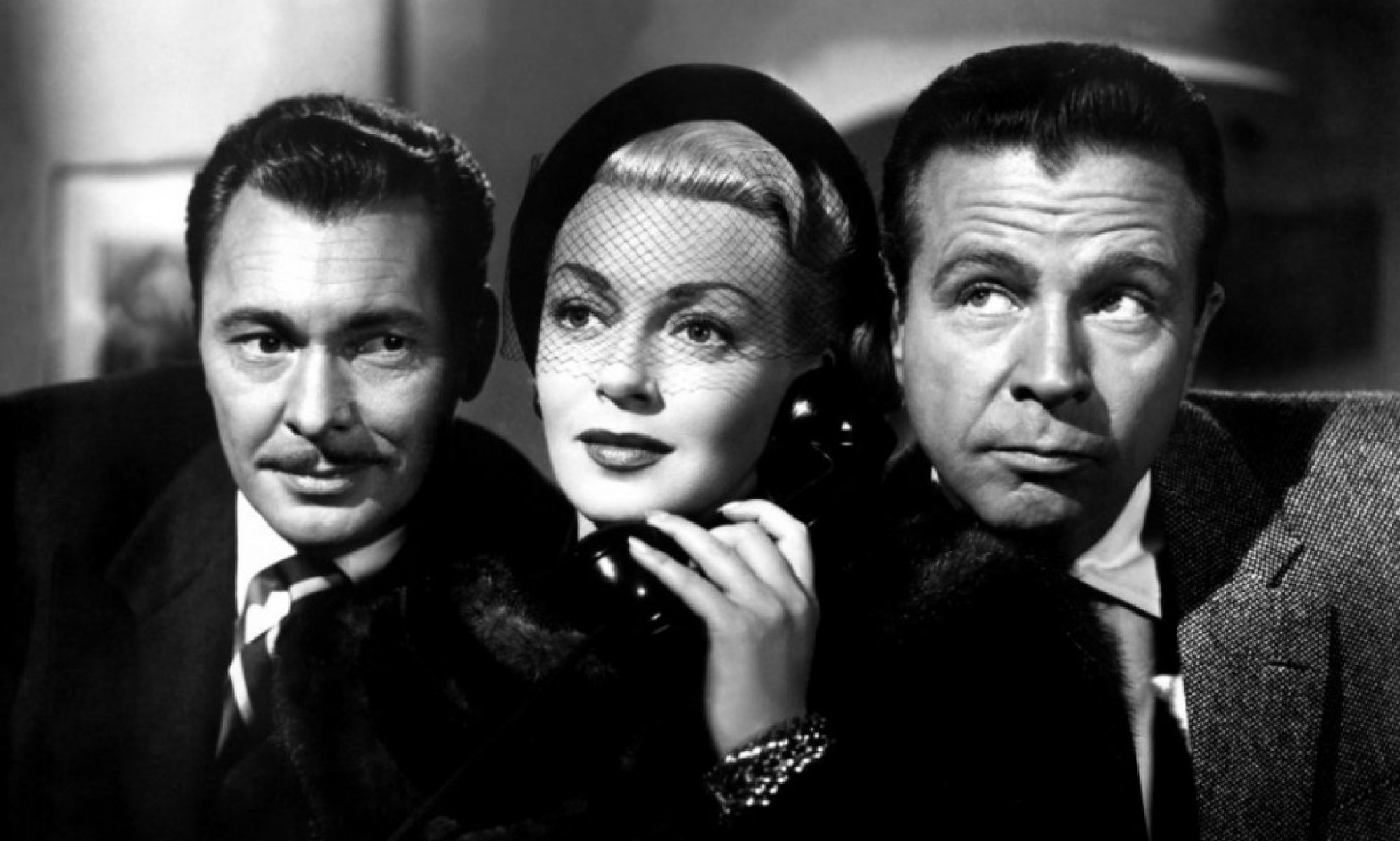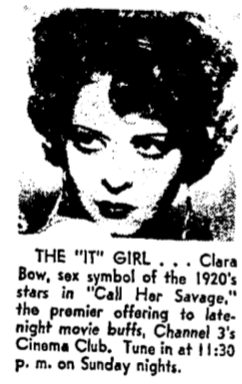
Five years or so into my sprawling “movies on TV” research project, I’ve studied thousands of old TV listings in newspapers going back to 1939 and revisited the titles that appeared (and were sometimes butchered) on some of my favorite New York City movie franchises like WCBS’ “The Late Show” and WOR’s “Million Dollar Movie. I was able trace these showcases’ rise and fall over a period of several decades, primarily with the help of the New York Times’ wonderful TimesMachine app, Free to subscribers, it gives access to full, searchable archival newspaper pages so I can see not only the listings but the editorial coverage and ads that accompanied them.
To help fill in gaps and blind spots in TimesMachines’ contents and searches (which are limited by using what look like very old microfilm scans in many cases) I have consulted other papers available from ProQuest Historic

Newspapers, most often The New York Herald Tribune and Newsday. I was especially delighted to discover that this service, which is free online to New York Public Library members like me, includes the archives of the Hartford Courant covering the years when I lived in the Connecticut capitol, 1973-1976. During that period was the one-year run of WFSB’s extraordinary “Cinema Club 3,” which introduced me to incredibly rare films like “Sunnyside Up” and the part-talkie “Four Feathers” (1929).
I joined the staff of the Hartford Times in October 1973 and lived in the Connecticut capital until that paper folded three years later. For a hard-core fan of ’30s and ’40s cinema who had enjoyed the bounty of such movies on TV and in revival house for many years, it was quite a culture shock. There were a few screenings at the Hartford Atheneum and Trinity College, where I first saw “Jezebel” and “Gold Diggers of 1933” on the big screen respectively. I got my first look ever at the 1934 “Imitation of Life” from a film society at the University of Connecticut at Storrs.
The film situation on local TV was dismal. The state had only two VHF stations, Channel 3 in Hartford and Channel 8 in New Haven. I was more familiar with WTHC (now WNHC) in Connecticut, because the New Haven station’s signal reached the south shore of Long Island and my aunt’s weekend house in Shirley. Back in the ’60s, I had frequently watched vintage horror and sometimes stuff like “The Informer” on Channel 8, which had both Screen Gems’s “Shock!” and “Son of Shock” packages as well as many RKO library titles supplied by C&C and its successor United Artists.
By 1973, those delights were all gone from WTHC, whose signal blanketed most of the state including Hartford, home of the CBS affiliate that had long been known as WTIC after its once well-heeled local owner, The Travelers Insurance Company. My recent research indicates that WTIC, like the New Haven Station, had leased many large pre-1948 packages from MGM, Fox and MCA (Paramount). But those titles did not have the staying power they had in New York City, which had seven VHF stations and devoted audiences for pre-’48 even after they largely migrated to public TV and cable in the 1990s.

WTIC, which was purchased from Travelers by the Post-Newsweek Station Group around the time of my arrival in 1973, would occasionally show a well-known Fox chestnut like “Young Mr. Lincoln” or “The Keys to the Kingdom” on its “Big Movie 3” on Sunday afternoon, which was always subject to preemption by CBS’ sports programming. Now known as WFSB, Channel 3 still showed movies in late night (it wasn’t yet clearing the adventurous “CBS Late Movie’) but as on Channel 8 they were invariably from the 1950s and 1960s, which we would consider fairly recent in 1973. Ditto for the films that WFSB showed from 7 to 9 pm on Monday nights, continuing for a time WTIC’s long-time practice of delaying an hour’s worth of CBS prime-time programming until 7 to 8 on Saturday nights.
Oldies, when they turned up at all, were more likely to be seen on the state’s UHF stations, the most viable of which was WVIT, the NBC affiliate broadcasting on Channel 30 in New Britain, a few towns west of Hartford. At the time, they had a regular Saturday night “Late Show” and an occasional “Saturday Afternoon at the Movies” entry drawn seemingly at random from United Artists’ better-known Warner Bros. and RKO’s Golden Age titles.
Then, without much fanfare, that all changed when WFSB introduced “Cinema Club 3” at 11:30 pm on Sunday nights, beginning 45 years ago tonight. Not only was this a series that showed almost entirely pre-code movies, but many of them had never even been shown on TV in New York City (and wouldn’t be for another couple of decades!)
I recently spent an evening reconstructing, through the miracle of ProQuest, the entire one-year run of “Cinema Club 3” and it’s quite an amazing list (see the bottom of this post) of films that had never been shown on TV, or hadn’t been shown in decades.
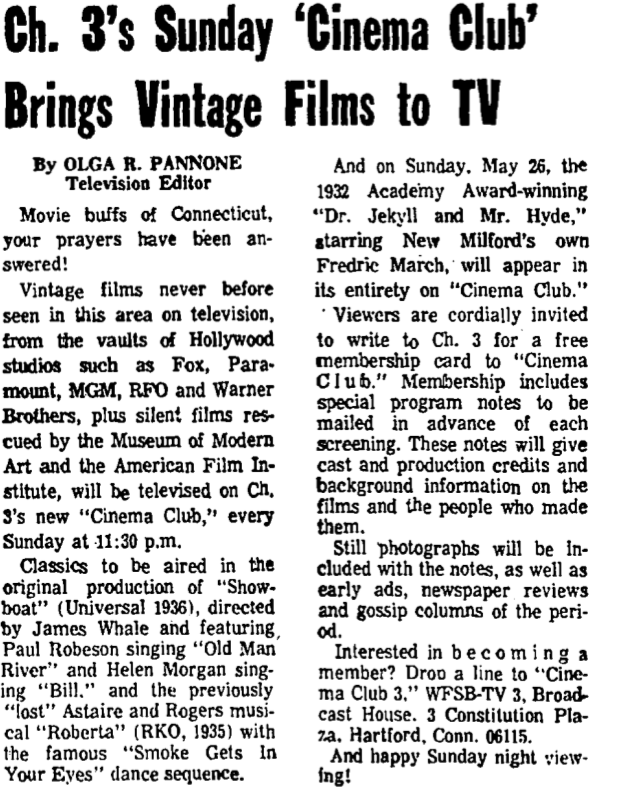
The March 31, 1974 premiere was so low-key that I missed the jaw-dropping Clara Bow vehicle “Call Me Savage” (1932), which I didn’t end up seeing until well into the 21st century. I do remember finding out about this series (I don’t remember whether it was a piece in the Courant’s TV book or some other way) in time for the second week’s offering, the long-unseen 1933 version of “State Fair.”
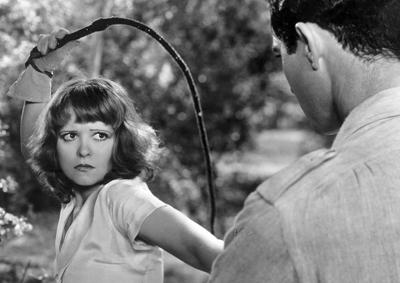
Most of the film were drawn from “Golden Century 50,” a late-arriving package of 1930s titles (mostly pre-code) that Fox had begun offering to TV stations in September 1971, comprised largely of presumed-lost titles found in the Fox vaults by producer producer Alex Gordon and Ellen Bowser, an archivist at the Museum of Modern Art (many restored by MoMA in recent years) as well as other titles that Fox had never cleared for TV showings like “Cavalcade” (mentioned as being prepped for possible TV showings as early as 1957).

Digging through listings around the country seems to indicate there were relatively few takers for “Golden Century 50,” which arrived a full decade after a flood post-1948 studio films began inundating TV stations. Even in New York City, TV station buyers seemed leery of a package with old, often obscure titles when so many familiar ’30s classics were readily available and enjoyed healthy ratings from viewers who considered them favorites. (The term “pre-code” was not yet in wide use as a marketing hook). Though Channel 55 on Long Island had for some reason cherry-picked the Oscar-winning “Cavalcade” (1933) as part of one of their Fox deals for a couple of runs in 1986, they did not arrive in New York City proper until WNET leased at least some of the “Golden Century” titles in 1992.
I’ve long been curious about how “Cinema Club 3” came about, especially after I discovered that WFSB mailed out illustrated program notes to interested viewers once a month. But failing to find anything except a few nostalgic references to CC3 viewers in comments sections of blogs, I asked one of my twitter buddies known as D Raff, who graciously agreed to help with his superior archival research skills. He came up with an August 1971 article from Broadcasting Magazine that linked “Golden Century 50” to an upcoming film series called “Cinema Club 9” on WTOP in Washington, D.C.
WTOP (WUSA since 1978), the flagship of the Post-Newsweek Station Group, was the first station to lease “Golden Century 50” for the first season of “Cinema Club 9.” The series, which ran until 1974, was clearly a passion project for Ray Hubbard, a TV visionary (he had created Mike Douglas and Merv Griffin’s syndicated shows while at Westinghouse Broadcasting in the ’60s) and self-described “old movie buff” who hosted the series himself on Saturday nights, wearing a tuxedo. He told Broadcasting that he hoped to “build a whole new audience for this kind of film.”
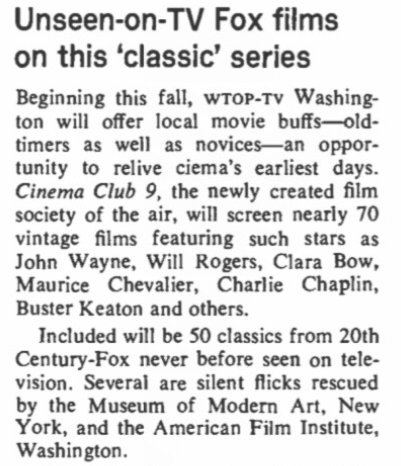
Hartford seems to be the only market where Post-Newsweek attempted to export the “Movie Club” concept, which had been expanded after the first season in D.C. to include newly-available pre-’48s from distributors other than Fox. Thus, we Connecticut viewers were able to see “Roberta” (RKO, 1935), “Dr. Jekyll and Mr. Hyde” (Paramount, 1931) and “The Scarlet Empress” (Paramount, 1933) years before they turned up on New York City stations. I don’t remember there being a host and can’t find any surviving video or even program notes online. (Film historian Jeremy Arnold was kind enough to e-mail me a scan of “Cinema Club 9” program notes he found in the file for CITY STREETS at AMPAS’ Margaret Herrick Library. They are written by Steven Zito, who Hubbard had recruited from the American Film Institute and went on to create CBS’ lucrative “CSI” franchise).
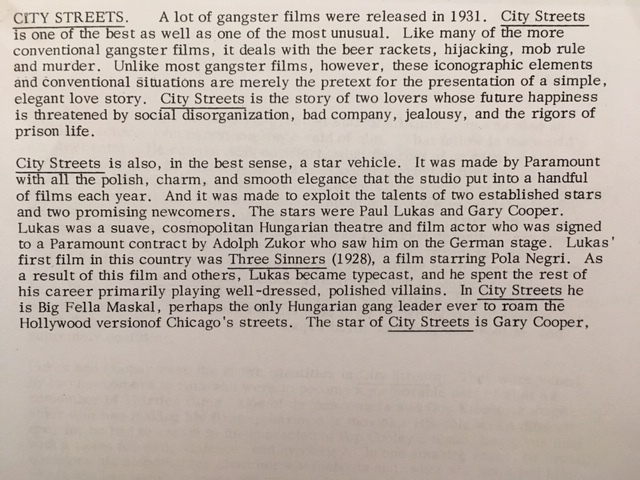
“Cinema Club 3” had its last broadcast on April 13, 1975 and none of the films was ever repeated on WFSB. It probably didn’t help that the series was broadcast on Sunday nights, which was quite a challenge in a city where many people were at work by 8 am (or, in my case 7) on Monday morning. Also, WVIT cut into the audience by swapping its Saturday night “Late Show” with its Sunday night “Tonight Show” reruns, and programming pre-codes against poor “Cinema Club 3.” I don’t remember CC3 having much in the way of support from advertisers, so WFSB probably made money by replacing it with off-network reruns of “Name of the Game.” But Ray Hubbard, who died in 1999 after a long struggle with dementia, has my thanks.
Here’s the list I compiled from that golden year of “Cinema Club 3” (and below that, a complete list of Fox’s “Golden Century 50” titles from the 1971 Broadcast Information Bureau catalogue, courtesy of film historian John McElwee.
3/31/74: Call Her Savage (Fox, 1932)
4/7/74: State Fair (Fox, 1933)
4/14/74: Love Me Tonight (Paramount, 1932)
4/21/74: The Big Trail (Fox, 1930)
4/28/74: Dirigible (Columbia, 1931)
5/5/74: Showboat (Universal, 1935)
5/12/74: The Power and the Glory (Fox, 1933)
5/19/74: Roberta (RKO, 1935)
5/26/74: Dr. Jekyll and Mr. Hyde (Paramount, 1931)
06/02/74: Pilgrimage (Fox, 1933)
6/09/74: Quick Millions (Fox, 1931)
6/16/74: Zoo in Budapest (Fox, 1933)
6/23/74: Hallelujah! (MGM, 1929)
6/30/74: Trouble in Paradise (Paramount, 1932)
7/07/74: What Price Hollywood? (RKO, 1932)
7/14/74: Tiger Shark (WB, 1932)
7/21/74: State’s Attorney (RKO, 1932)
7/28/74: Applause (Paramount, 1929)
8/4/74: The Cock-Eyed World (Fox, 1929)
8/11/74: Me and My Gal (Fox, 1932)
8/18/74: Taxi! (WB, 1932)
8/25/74: Blessed Event (WB, 1932)
9/1/74: Hell’s Highway (RKO, 1932)
9/8/74: Pre-empted
9/15/74: The Scarlet Empress (Paramount, 1934)
9/22/74: Sunnyside Up (Fox, 1929)
9/29/74: Bombshell (MGM, 1933)
10/6/74: The Four Feathers (Paramount, 1929)
10/13/74: Rasputin and the Empress (MGM, 1932)
10/20/74: The Kennel Murder Case (WB, 1933)
10/27/74: Miracle Woman (Columbia, 1931)
11/3/74: The Big House (MGM, 1930)
11/10/74: Flight (Columbia, 1929)
11/17/74: The Love Parade (Paramount, 1929)
11/24/74: Sherlock Holmes (Fox, 1932)
12/1/74: American Madness (Columbia, 1932)
12/8/74: Murder at the Vanities (Paramount, 1934)
12/15/74: Wild Boys of the Road (WB, 1933)
12/22/74: Delicious (Fox, 1931)
12/29/74: Supernatural (Paramount, 1933)
1/05/75: Ladies of Leisure (Columbia, 1930)
1/12/75: Folies Bergere (20th, 1935) *
1/19/75: Chandu the Magician (Fox, 1932)
1/26/75: Gabriel Over the White House (MGM, 1933)
2/2/75: Born to Be Bad (20th, 1934)
2/9/75: Cavalcade (Fox, 1933)
2/16/75: Dames (WB, 1934)
2/23/75: The Secret 6 (MGM, 1931)
3/2/75: Doctor Bull (Fox, 1933)
3/9/75: Forbidden (Columbia, 1932)
3/16/75: One Night of Love (Columbia, 1934)
3/23/75: The Yellow Ticket (Fox, 1931)
3/30/75: Pre-empted
4/6/75: City Streets (Paramount, 1931)
4/13/75: The Bitter Tea of General Yen (Columbia, 1933)
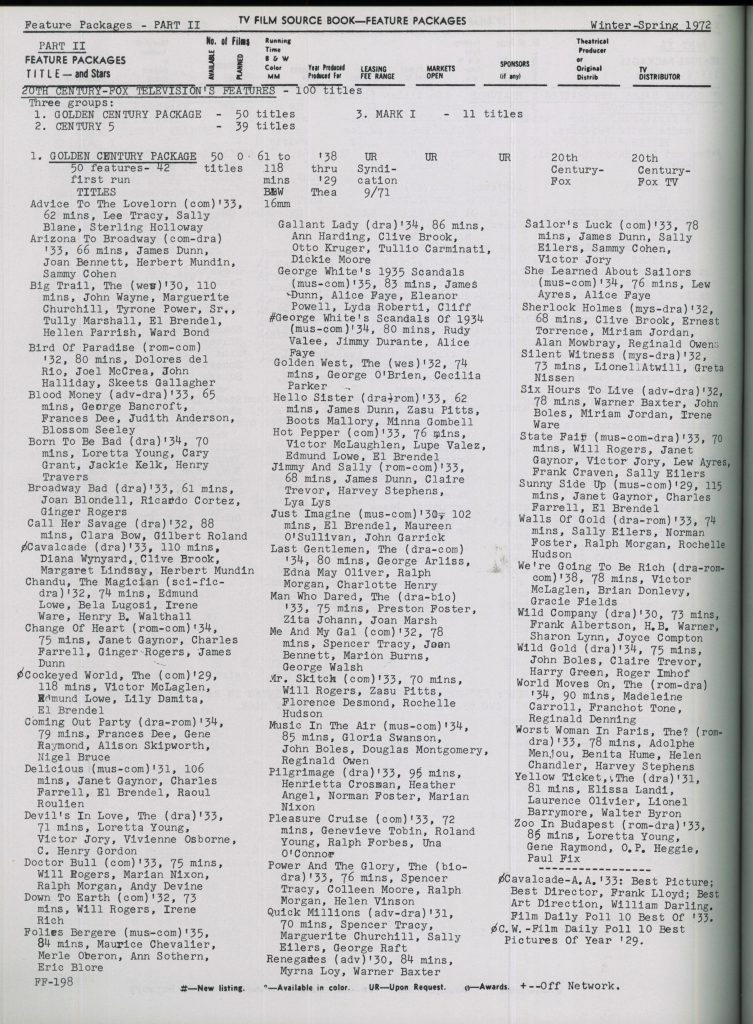
That’s all, Folks!
